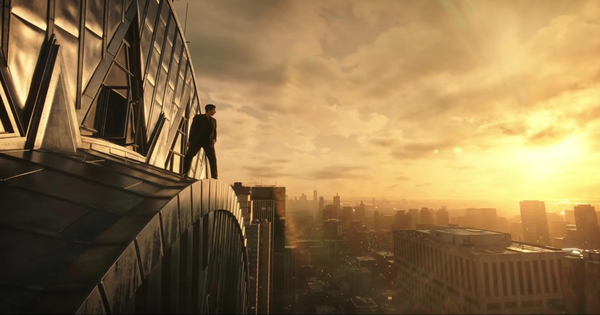The oddity of Megalopolis is that it is neither as far-reaching nor as demented as its reputation suggests. The epic film, decades in the making, is a resounding commercial flop and a polarizer of critics everywhere. The median moviegoer has stayed away. Even if it weren’t for its manifold flaws and eccentricities, the film is probably too unclassifiable to do well in this cultural environment: No intellectual property is mined and no real events are restaged. The star-studded cast simply isn’t enough of a draw and the word-of-mouth is a muddle.
I can’t offer two thumbs shot straight up in the air. My praise is qualified, tentative even. Yet I do believe Megalopolis is more a success than a failure. It is a confirmation of Coppola’s moxie, and it contains ambition that is too often missing from contemporary artistic projects, whether they be films or novels. I saw glimmers of Tom Wolfe and Thomas Pynchon in it, and this gladdened me. Here, at least, was an auteur who was going to leave it all on the field. The film’s poor showing at the box office doesn't bode well for the kind of expansive dreaming and gusto that it celebrates, at least when it comes to Hollywood, but the mad determination of both the director and his protagonist suggests that our cultural future may not be completely listless.
The narrative of the film, a takeoff on the Catilinarian conspiracy of Ancient Rome, is relatively straightforward. Adam Driver plays Cesar Catalina, a brilliant architect who has the power to stop time. Cesar dreams big, like a mystic Robert Moses, and he has won a Nobel Prize for inventing a new building material called megalon. He belongs to the elite of New Rome, a barely disguised retro-futuristic New York City, and he is the bane of the existence of Mayor Franklyn Cicero (Giancarlo Esposito), who possesses a much more banal vision for urban development. Whereas Catalina dreams of a shimmering utopia known as Megalopolis—he will build it, golden, from megalon—Cicero talks up a new casino to belch up tax revenue.
Cicero and Cesar have quite the past: When he was district attorney, Cicero prosecuted Cesar for the murder of his own wife, though the architect was acquitted and it’s made clear that her death was actually a suicide. To cope, Cesar drinks heavily, and is engaged in an unsatisfying affair with a vapid talk show host, Aubrey Plaza’s Wow Platinum. Eventually spurned by Cesar, Platinum marries his elderly uncle, Hamilton Crassus III (Jon Voight), the world’s richest man and the financier of Cesar’s architectural dreams. Meanwhile, Cesar falls in love with the mayor’s daughter, Julia (Nathalie Emmanuel.)
Cesar’s first cousin Clodio Pulcher—and Crassus’s other nephew—is a bumbling failson who wants to thwart Cesar. Played at a curious register by Shia LeBeouf, Clodio is the Donald Trump stand-in, and he briefly leads a populist revolt against Cesar’s Megalopolis plan, in part by galvanizing residents displaced by the vast construction project. Coppola never seems fully invested in Clodio, and the uprising doesn’t gain serious steam; Cesar is not truly threatened, even after a gun is aimed at his face and the bullet discharges. Cicero, perpetually unnerved by Cesar’s ambition, eventually sees the light, and Megalopolis finds itself, for all its ranginess, at a pat and too-tidy endpoint.
There’s a Randian bent to Megalopolis’s deification of its visionary architect protagonist and its implicitly anti-democratic dismissal of mass politics, even if Coppola’s vision is fundamentally more humane. Cesar does not succumb to megalomania or fascism, and in the end proves to be nothing like his closest real-world analogue, Elon Musk, who has a high school freshman’s conception of politics. At heart, Coppola is an optimist, and his scientist is not mad. Light, a bit too predictably, triumphs over darkness.
For all its quasi-hammy acting and visuals that alternate between stunning and befuddling, it’s a film that one can’t look away from, and that is a credit to the director’s haphazard yet compelling world-building. Moreover, as Ross Douthat argued, Megalopolis is interesting because it’s attempting to communicate something about our world as it is. It does not race away from the present day, hiding in the cloth of a historical drama, and it strikes at a few unsettling American realities. Cesar is at war against inertia. The great mayor of New Rome can think of nothing grander than a new casino, not unlike our own politicians who are trying to peddle gambling as an economic development model in New York instead of dreaming bigger.
“What is stuck can always come unstuck.”
Perhaps all of this is a metaphor for the existence of the film itself, which Coppola self-financed and finally dragged to life when he reached his 80s. No ordinary director could pull this off. Megalopolis is in movie theaters because Coppola directed the first two Godfather films and Apocalypse Now. It exists because, at one time, Coppola was himself something of a Hollywood Cesar, and if he is no longer capable of such magic, he can at least be an original. And we are, in this atomized and spammified age, so bereft of those.
For now, Megalopolis will be regarded as a fantastic flop, and since movies are mainly judged in the most utilitarian way imaginable—a book with an enormous advance that doesn’t sell enough is not disdained in the same manner as a box-office dud—this could drive the film industry further away from innovation. Hollywood, the realm of retreads, has little to offer us anymore, and it seems we are going to choke on sequels of sequels and ever-duller IP until human civilization collapses. Coppola cannot arrest this decline, and there are no Cesar Catalinas riding in to save the decadent mainstream. Creativity will arise elsewhere, from what has not been captured by sclerotic conglomerates. There is still a hunger for what is new and unusual. What is stuck can always come unstuck. Dynamism isn’t dead yet. Coppolla is right about that.
